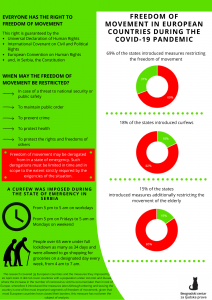BCHR’s analysis of the lockdown measures in European countries shows that the restrictions of the freedom of movement of Serbia’s citizens imposed by the Serbian authorities to prevent the spread of COVID-19 were amongst the most drastic in Europe. The state of emergency, imposed in Serbia on 15 March 2020, was abolished after 53 days by a parliamentary decision adopted on 6 May 2020. Many human rights of Serbia’s citizens enshrined in the Constitution and ratified international treaties were restricted during the state of emergency.
Freedom of movement was undoubtedly the right that was restricted the most in Serbia. The BCHR filed an initiative with the Constitutional Court to review the constitutionality of the Decree on the State of Emergency Measures and the Order Restricting and Prohibiting Movement of Individuals in the Territory of the Republic of Serbia. While we wait for the Constitutional Court’s reply to the question whether the Ministry’s Order constitutes valid legal grounds for derogations from constitutional rights, we would like to draw attention to another important issue – the scope of the restrictions of the freedom of movement.
Article 202(1) of the Serbian Constitution allows derogations from specific human rights during a state of emergency, but only to the extent deemed necessary. Similarly, Article 4 of the International Covenant on Civil and Political Rights (ICCPR) sets out that in time of public emergency, states may take measures derogating from their obligations under the ICCPR to the extent strictly required by the exigencies of the situation. The Human Rights Committee said in its General Comment 29 on Article 4 of the ICCPR that States parties considering invoking Article 4 should carefully consider the justification and why such a measure is necessary and legitimate in the circumstances.
The impugned Order introduced a curfew during the state of emergency. Serbia’s citizens were under lockdown from 5 pm (and on some days from 3 pm) to 5 am on workdays, and from 5 pm on Fridays to 5 am on Mondays on weekends. People over 65 were under full lockdown as many as 34 days and were allowed to go shopping for groceries on a designated day every week, from 4 am to 7 am.
The BCHR’s analysis of the restrictions of the freedom of movement other European countries introduced in response to the pandemic shows that Serbia’s measures restricting and prohibiting the freedom of movement of its citizens were definitely amongst the most drastic in Europe. Frequent changes in the scope and periods of the restrictions and the illogicality of the order in which the measures were introduced and lifted created confusion among the people, who often had problems conforming their conduct and actions to the valid measures, as numerous cases of citizens penalised for violating the lockdown testify. The question remains whether such strict measures restricting and prohibiting the freedom of movement were necessary to achieve the goal – halt the spread of COVID-19, i.e. whether the same result could have been achieved by measures interfering less in the citizens’ rights, as well as whether the state acted in violation of the Constitution and international law in this case.
More in the Infographic








